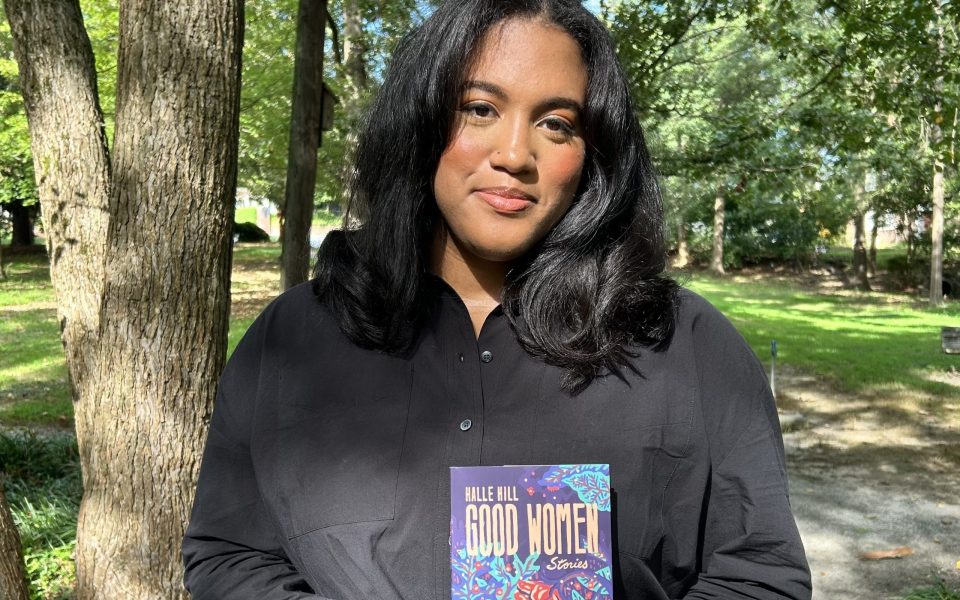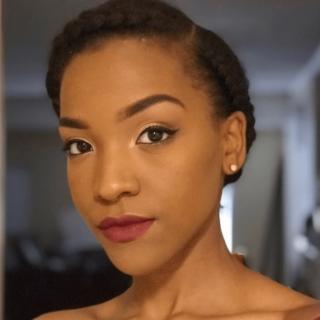Featured photo: Winston-Salem author Halle Hill celebrated the debut of her story collection that focuses on the lives of 12 Black women across the Appalachian South
Winston-Salem author Halle Hill grew up surrounded by storytellers, so it’s no surprise she became one herself. She earned an MFA in writing from Savannah College of Art and Design in 2020, won the 2021 Crystal Wilkinson Creative Writing Prize and was a finalist for the 2021 ASME Award for Fiction.
On Sept. 12 Hill made her debut with the release of Good Women, a collection of short fiction that explores the lives of 12 Black women across the Appalachian South. On Sept. 14, Hill stopped by Scuppernong Books in Greensboro to kick off the promotional tour of the book and participate in discussions, readings and book signings. On Sept. 23 at 1 p.m., Hill will be at Bookmarks in Winston-Salem as part of the Bookmarks Festival of Books and Authors.
Originally from east Tennessee, Hill combines her personal experiences growing up in the region with a vivid imagination to craft tales tackling religion, coming of age, breaking generational curses and more. In our conversation, Hill talked about what piqued her interest in writing, how her identity influenced the collection and some of the passages found in Good Women.
Learn more about Halle Hill at hallehill.com and on Instagram @hallewrites.
This conversation has been edited for length and clarity.
What got you interested in writing?
I’ve always enjoyed writing and been passionate about it. I think I got more interested in grad school when I went for my MFA, but I’ve always just loved learning about other people’s stories. I’ve always loved one-on-one conversations with people, and my family was always filled with stories.
I just spent a lot of time with my grandmothers, aunts and cousins and they told a lot of stories so I think naturally, I just was excited about them. It’s a great way to get to know people and learn about your family and preserve your history.
How did your appearance at Scuppernong go?
The appearance at Scuppernong kicked off my book tour so it was the launch event. I think it went really well. There were some great questions, and I read the first story from my collection called “Seeking Arrangements.” I was just so grateful to be at Scup because it’s such an important bookstore in the Piedmont community and North Carolina in general. I’ve always admired how they support the community by selling, promoting and supporting diverse books and authors. It was more than wonderful to be able to launch my book there.
The Appalachian Region spans from southern New York to northern Mississippi. As someone from Tennessee, how did your personal experiences growing up influence the stories you chose to tell in Good Women?
I am just really proud to be from Appalachia, and it’s exciting to be able to talk about stories that are set in areas that I’m from or maybe even write about a different experience in Appalachia. I think it’s heavily mystified and a lot of people have these preconceived notions about it, and that’s just something that I’ve enjoyed kind of exploring and writing about from my perspective.

I think what’s really powerful about Appalachia is that a large chunk of it kind of expands out of the South. People don’t always realize it’s really broad, and there’s going to be a lot of diverse people from there. It’s rural and it’s filled with metropolitan cities. It’s filled with all different races and ethnicities of people, different walks of life, socioeconomic experiences, so I’m excited to be able to write about it.
If anything I hope people will read my book and maybe be more curious about the region and grow in their respect and care for the place, too.
In “Bitch Baby” the narrator Ceiley witnesses her gay brother being beaten by the police during a traffic stop. Were there any real-life cases that served as inspiration? Why did you find it important to include this?
I can’t necessarily say that there were specific cases of police brutality super specific to the one that I write about in “Bitch Baby,” but I think the painful part is just because I haven’t witnessed that specific experience with that level of violence in my personal family, that doesn’t mean it couldn’t happen and that it won’t still happen to someone one day.
I definitely have experienced, seen and know the pain a lot of us Black Americans carry around by just trying to navigate that area. I just wanted to explore that and write about it. That’s the hard part about the story; it’s not a fantasy, it’s a reality a lot of Black Americans experience.
Something I picked up on was how the parents of Black, gay men oftentimes have difficulty supporting their child for religious reasons.
For the mom in “Bitch Baby,” I think that belief set is really harmful. I think that she’s also deeply in shock and hurting for her baby, and she’s just trying to find something to cling onto to give meaning. In a way, even if she is perpetuating harm, the act of brutality has harmed her and her child.
Which piece resonates with you the most and why?
I really do love and feel challenged by and I’m so grateful for every story in the collection so it’s hard for me to say which one resonates with me, but I can tell you which one I feel I had to work and earn to write. “The Miracle” was a challenge for me to write because it is a devastating story that has glimmers of hope. It’s a hard story that’s hard for me emotionally, but I felt it was important for me to write. “The Miracle” is really special to me for a bunch of reasons.
What do you want readers to take away from Good Women?
I believe in readers having their own experience of a book and I’m hesitant to suggest what I hope readers take away because people have to come to that on their own. What’s important for me, though, is that I do hope readers, if anything, will approach the stories with an open mind and compassion. Some of the women make difficult decisions, and I think it can be really easy to feel frustrated with them; having compassion for them would be great.
There’s a lot of joy I had writing the collection of just talking about different areas that are important to me, different cities that I’ve been through and traveled through throughout my childhood or my life that are probably lesser-known.
There’s some very East-Tennessee places and ways I mention and I would invite readers to if you see something that you don’t know about, look it up and maybe learn more about a place. Be open to challenging yourself to how it could be different than how you may have thought about it before.
Join the First Amendment Society, a membership that goes directly to funding TCB‘s newsroom.
We believe that reporting can save the world.
The TCB First Amendment Society recognizes the vital role of a free, unfettered press with a bundling of local experiences designed to build community, and unique engagements with our newsroom that will help you understand, and shape, local journalism’s critical role in uplifting the people in our cities.
All revenue goes directly into the newsroom as reporters’ salaries and freelance commissions.


Leave a Reply